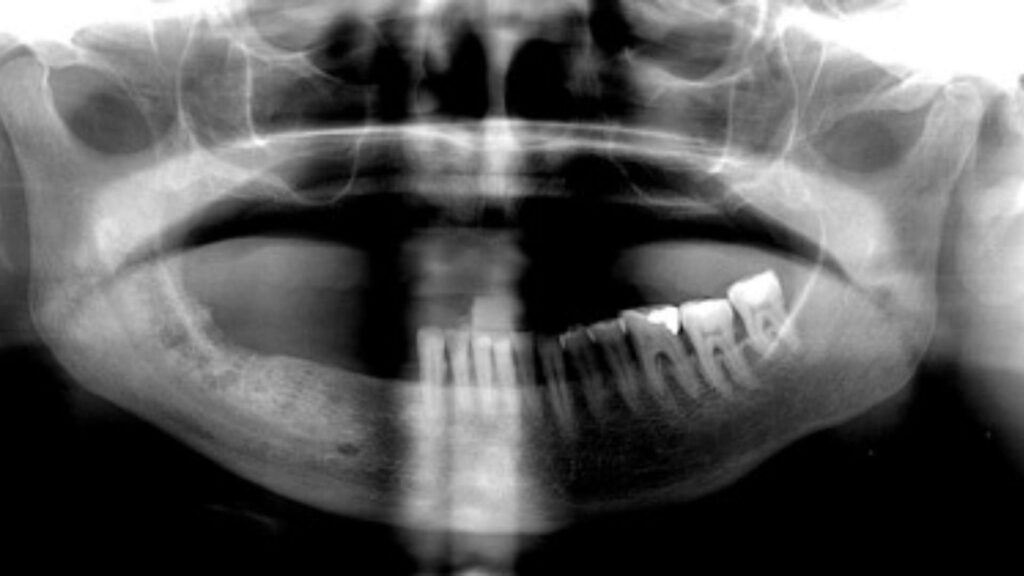Bisphosphonate-Related Jaw Necrosis
Bisphosphonates are a class of medications widely prescribed to treat conditions like osteoporosis and cancer-related bone diseases. While they have proven to be effective in strengthening bones and reducing fractures, they also come with a rare but serious side effect known as Bisphosphonate-Related Jaw Necrosis (BRON). This condition can complicate dental procedures, including dental implant therapy. In this blog post, we’ll explore what BRON is, its risk factors, and the essential preventive measures to consider before undergoing implant therapy.
Understanding Bisphosphonate-Related Jaw Necrosis (BRON)
BRON is a rare condition characterized by the death of jawbone tissue (osteonecrosis) that occurs spontaneously or following minor trauma, often associated with dental procedures. It is typically linked to the long-term use of bisphosphonate medications, both orally and intravenously. While the exact cause of BRON is not fully understood, it is believed that bisphosphonates may disrupt normal bone remodeling processes, leading to the development of necrotic tissue.
Risk Factors for BRON
Not everyone taking bisphosphonates will develop BRON, and several factors can increase the risk of this condition. Some of the key risk factors include:
- Duration of Bisphosphonate Use: The longer a person has been taking bisphosphonates, the higher the risk.
- Intravenous (IV) Bisphosphonate Use: BRON is more commonly associated with intravenous bisphosphonate therapy, often used in cancer treatment.
- Higher Doses: High doses of bisphosphonates may increase the risk.
- Underlying Dental Issues: Pre-existing dental problems, such as gum disease or tooth extractions, can raise the risk.
- Smoking and Alcohol Consumption: These factors may contribute to a higher risk of BRON.
Preventive Measures Before Implant Therapy
For individuals taking bisphosphonates who require dental implant therapy, it’s essential to take precautionary measures to minimize the risk of BRON. Here are some suggested preventive steps:
- Consult Your Physician and Dentist: Before undergoing implant therapy, consult both your prescribing physician and dentist. They can assess your medical history, bisphosphonate use, and overall oral health to determine your risk.
- Timing is Crucial: If possible, consider a drug holiday (temporary discontinuation of bisphosphonates) before implant surgery, under the guidance of your healthcare providers. This should be carefully evaluated, as discontinuing the medication may have other health implications.
- Consider Alternative Treatments: Explore alternative implant materials, such as zirconia or PEEK (polyether ether ketone), which may carry a lower risk of BRON compared to titanium implants.
- Maintain Good Oral Hygiene: Prioritize regular dental check-ups, cleanings, and maintenance of oral health to minimize the risk of infections that could lead to BRON.
- Limit Invasive Dental Procedures: Whenever possible, opt for less invasive dental procedures. For instance, opt for a removable partial denture instead of a dental implant if it meets your needs.
- Communicate with Your Dental Team: Ensure that your dental team is aware of your bisphosphonate use and the associated risks, so they can tailor your treatment plan accordingly.

Conclusion
Bisphosphonate-Related Jaw Necrosis is a rare but serious condition that individuals taking bisphosphonate medications should be aware of, especially when considering dental implant therapy. Open communication with both your physician and dentist is crucial to assess your risk factors and implement appropriate preventive measures. While the risk of BRON should not deter individuals from seeking necessary dental treatment, a well-informed and proactive approach is essential for safer and successful implant therapy.
Remember, every patient is unique, and treatment decisions should be made in consultation with healthcare professionals who can provide personalized guidance based on your specific medical and dental history.
References:
- Ruggiero SL, Dodson TB, Assael LA, et al. American Association of Oral and Maxillofacial Surgeons position paper on bisphosphonate-related osteonecrosis of the jaws—2009 update. Journal of Oral and Maxillofacial Surgery. 2009;67(5_suppl):2-12.
- Marx RE. Pamidronate (Aredia) and zoledronate (Zometa) induced avascular necrosis of the jaws: a growing epidemic. Journal of Oral and Maxillofacial Surgery. 2003;61(9):1115-1117.
- Ruggiero SL, Dodson TB, Fantasia J, et al. American Association of Oral and Maxillofacial Surgeons position paper on medication-related osteonecrosis of the jaw—2014 update. Journal of Oral and Maxillofacial Surgery. 2014;72(10):1938-1956.

